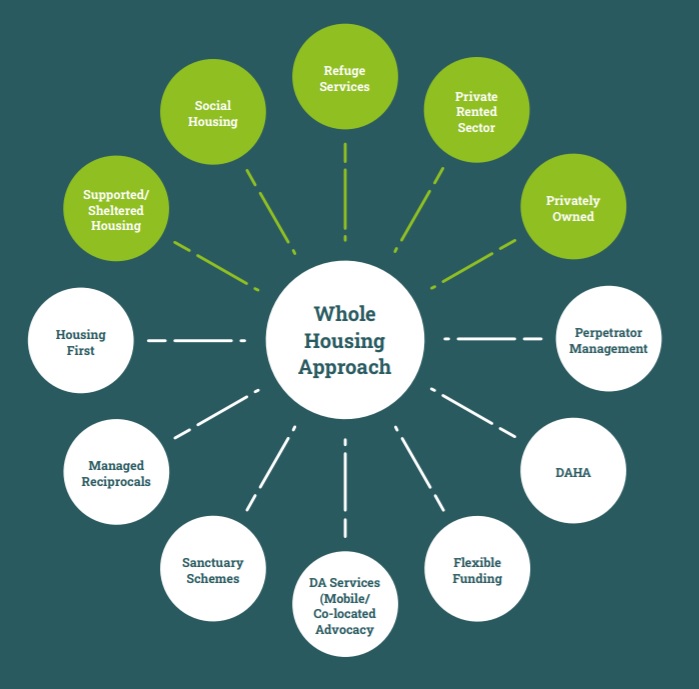
Domestic abuse has been rising up the political agenda in the past few years. 2019 saw the appointment of the UK’s first Domestic Abuse Commissioner, and last month, the updated Domestic Abuse Bill was introduced to the UK Parliament (expecting to see Royal Assent in April 2021). But domestic abuse is still a widespread and endemic problem across the UK, with figures suggesting incidents across all areas of the country and across multiple demographic groups.
Often people who experience domestic abuse are difficult to identify and can struggle to engage directly with domestic violence support services. However, there is a growing recognition that knowledge sharing, and partnership working between statutory services, like housing or health teams, is vital to identifying and supporting victims and survivors in a timely and effective way.
Increasingly, the criminal justice system, health sector, social housing providers, charities, and local government have been attempting to work together to ensure that they are all able to respond effectively and provide the necessary support to domestic abuse victims and survivors.
The impact of lockdown
The most recent Crime Survey for England and Wales released by the Office for National Statistics (ONS) showed that an estimated 2.3 million adults aged 16 to 74 years experienced domestic abuse in the last year (1.6 million women and 757,000 men). Research published by the London School of Economics (LSE) after the first lockdown found that in London domestic abuse calls to the police increased by 11.4% on average, compared with the same weeks in 2019. The increase was, in a large part, due to an increase in calls from third parties not directly witnessing the incident, including neighbours or family members.
Similarly a report from Women’s Aid found that those delivering services needed to grapple not only with increased demand for support, but also with the challenge of delivering effective support in a different way as many services were only able to be accessed virtually.
Coordinated community responses transforming support for survivors
Organisations are becoming increasingly aware of the roles they can play in supporting people who experience domestic abuse and in the early identification of people at risk. Research also suggests that if someone is experiencing abuse, there is a high likelihood that they will also be experiencing other “needs”, which may cause them to come into contact with multiple services at once. Co-ordinating the response between services encourages organisations to share information to ensure consistency of care and experience; it can also help identify any gaps in support and allow for appropriate signposting and places the onus on the organisations, rather than on the person experiencing abuse.
Coordinated community response (CCR) approaches encompass the broadest possible response to domestic abuse; CCR addresses prevention, early intervention, dealing with crisis, risk fluctuation, and long-term recovery and safety, working with a wide range of services, pathways, agencies, and systems.
The fundamental premise of the CCR is that no single agency or individual can see the complete picture of the life of a family or individual within that family, but all may have insights and can provide interventions that are crucial to their safety and wellbeing. The CCR enables a whole system response to the whole person. It shifts responsibility for safety away from individual survivors to the community and services existing to support them.
The CCR is made up of 12 components: survivor voice; intersectionality; shared objective; structure and governance; strategy and leadership; specialist services; representation; resources; co-ordination; training; data; policies and processes. Taking a CCR approach provides communities with method for coordinating a response to domestic abuse. It places survivors at the heart of decision making and is an approach many frontline services can and do take when designing and implementing support services for people who have experienced domestic abuse.

A pilot roll out for wrap around housing support
The Whole Housing Approach (WHA) to domestic abuse was first conceptualised in 2018 by the Domestic Abuse Housing Alliance (DAHA) in collaboration with the National Housing and Domestic Abuse Policy and Practice Group This approach aims: “to improve the housing options and outcomes for people experiencing domestic abuse so that they can achieve stable housing, live safely and overcome their experiences of abuse.”
The approach enhances how people who have experienced domestic abuse have control over their own lives, considers what they want to achieve and change, and offers interventions based on this. The key principles of the WHA are outlined as: safety; inclusivity; empowerment; accountability; and prevention, with 12 additional key components which make up the practical application of WHA programmes.
The initial WHA pilot project was delivered in three areas from October 2018 to the end of March 2020. Six specialist domestic abuse organisations, as well as a civil society organisation, have been working with 10 local authority areas, including in London, Stockton and Cambridgeshire to establish comprehensive and consistent housing practices and deliver a WHA.
A whole housing approach toolkit has been published which contains more information on the pilots, evaluations and analysis of the programme. The toolkit includes a dedicated section for each of the twelve components of the WHA. Each section can be read as a standalone toolkit that outlines key initiatives to help survivors achieve safety and stable housing. It offers practical guidance and resources to local areas to deliver a consistent WHA to domestic abuse.

Final thoughts
While the landscape of domestic violence support is varied and is delivered in different ways by different agencies, there is a growing understanding of the practical steps which should be taken to ensure that partnership working and effective coordinated responses between services are offered to survivors of domestic abuse. It is clear that there is an appetite among those who work within frontline services to improve the availability of support. The ultimate aim of a coordinated response and a wraparound service to survivors of domestic abuse is achievable if current best practice and effective pilot schemes can be built upon, with additional funding and wider roll outs.
If you enjoyed this article you might like to read:
Domestic violence during quarantine: the hidden crime of lockdown
Safeguarding in social isolation: how social care teams are adapting to the new normal
A home for life? Developing lifetime neighbourhoods to support ageing well in place
Follow us on Twitter to see which topic areas are interesting our research team.
Share
Related Posts
By Donna Gardiner While free school meals (FSM) have been available in England on a means-tested basis since 1944, recent years have seen a renewed focus upon the potential benefits of providing free school meals to all school-aged children. Currently, ....
Today sees the start of Community Garden Week 2023. Across the UK, communities will be celebrating the many and varied types of community gardens, from children’s and neighbourhood gardens to therapy gardens and allotments. The benefits of community gardens are ....

